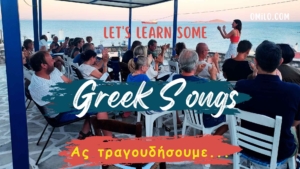Music, Dance, the Omilo-Song, and a lot of fun…
When listening to the video testimonials, you will hear many times the word “fun”!
Yes, at Omilo, learning Greek is not boring, but really fun! Not only the Greek lessons are fun, with a lot of variety and interaction, but also the afternoon activities
Also, every year we have several students with musical talent, as well as a lot of students with dancing talent
Also in 2024, we danced, we sang, we had fun… Of course, always after the Greek lessons 🙂
Below some videos to get a better idea
Greek dancing lesson;


Learning Greek songs
testimonials – WHAT DO OUR STUDENTS SAY
Organizing courses, creating materials, offering cultural activities and producing videos is what we do—but Omilo wouldn’t exist without you, our amazing students!
Your enthusiasm and support have made it possible for us to keep going strong for 27 incredible years.
Your feedback and the ongoing conversations between students, teachers, and our admin team inspire us to keep evolving. Every year, we refine our programs to ensure they deliver not just top-notch language learning but also memorable experiences filled with fun, laughter, and new friendships from around the globe.
We’re especially grateful to the students who’ve shared their Omilo stories on video.
These heartfelt testimonials, set against a beautiful Greek background, let others see what it’s like to be part of the Omilo family.
NOTE
Several of testimonials taken during Athens, Syros and Naxos courses in 2024 are not included yet,
since Maya did not have time yet to edit and subtitle them, but they will be uploaded during the following months.
Χαρήκαμε πολύ που τόσοι μαθητές ήταν πρόθυμοι να πουν κάτι σε βίντεο! Έτσι, μπορείς να πάρεις μια καλύτερη ιδέα, με όμορφο φόντο από την Ελλάδα .
Άκουσε διάφορους μαθητές μας στο κανάλι μας στο YouTube.
Σημείωση: Αν σου αρέσουν αυτά που λένε οι μαθητές, μην ξεχάσεις να πατήσεις “LIKE” ή να γράψεις το σχόλιό σου κάτω από το βίντεο.
Τα τελευταία βίντεο δεν συμπεριλαμβάνονται, καθώς η Maya δεν είχε ακόμα χρόνο να τα επεξεργαστεί και να βάλει τους υπότιτλους.
+++++++++++++++++++++++++++++++++
Why (most) students speak in their mother tongue on the video and not in Greek?
Γιατί οι μαθητές στα βίντεο μιλάνε στη μητρική τους γλώσσα και όχι στα Ελληνικά;
Although students know Greek, and could also say many things in Greek, we usually advise them to talk on the video in their mother-tongue.
The reason is that they can express themselves much better with the vocabulary and expressions they like to use, and they also feel better to be in front of a camera.
Another reason is that sometimes “unwanted visitors” , who are not related to Omilo, watch those testimonials and write nasty comments under the video,
in case the person makes a mistake in Greek. Unfortunately we can not control the internet, but we would like to protect our students from unnecessary comments.
At Omilo, we all know your Greek is good, you improve, you try to speak, you love the language, but there is no reason to prove it in front of the entire digital world.








